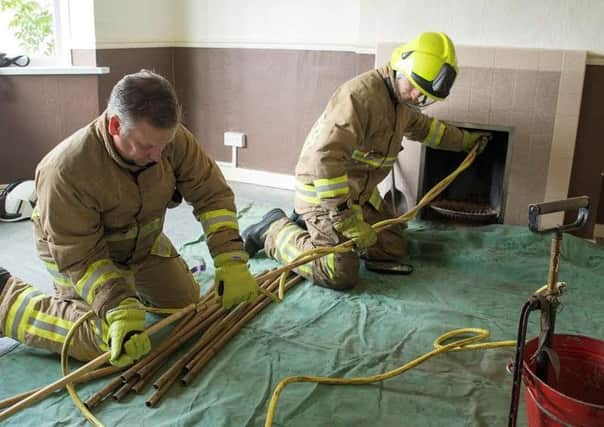FEATURE: Make sure you get your chimney swept - it could save your life


The stark warning comes after a significant spike in chimney fires in the past three weeks, with Lincolnshire Fire and Rescue reporting at least nine separate incidents during this time period.
Chimney fires are usually caused when combustible deposits - primarily soot and creosote - are allowed to build up within the flue-ways over a long period of time without being cleaned out. These materials can end up being accidentally ignited by the flames and high temperatures the next time the homeowner lights their fire, resulting in serious damage to the chimney and potentially the rest of the building.
Advertisement
Hide AdAdvertisement
Hide AdUrging people to ‘sweep’ rather than ‘weep’, Lincolnshire Fire and Rescue pointed to a spate of chimney blazes in homes across the county including Louth, Woodhall Spa, Boston, Stamford, North Scarle, Billingborough, Spalding, Gainsborough, and Fleet near Holbeach.
The last three fires all took place in the same evening - Monday, January 9, and were all caused by a build up of soot inside the chimney.
John Barke, deputy community fire safety manager at Lincolnshire Fire and Rescue, said: “The three incidents in Spalding, Gainsborough and Fleet come as a timely reminder for people to maintain their chimneys and open fires.
“With temperatures dropping and more people relying on fires to heat their homes, it’s important that people take the time to follow our advice.
Advertisement
Hide AdAdvertisement
Hide Ad“Please get your chimney swept to avoid putting your life or those around you in danger.”
A fire service spokesman added: “Chimney fires can be very dangerous - they can damage your fireplace, wood-burner, flue or chimney and they can spread quickly throughout your house and even neighbouring properties.
“The best way to prevent a chimney fire is to have your chimney swept on a regular basis to remove the build-up of soot and deposits that occurs through regular burning of carbon-based fuels.”
David Kemp, from Clean Sweeps in Woodhall Spa, has been sweeping fireplace and stove chimneys for the past five years.
Advertisement
Hide AdAdvertisement
Hide AdHe said that many people with working chimneys in their home had a cavalier attitude towards the risks of chimney fires, with some people failing to have a professional sweep carried out for over half a decade - rather than at least once or twice a year, as recommended.
David said: “There have occasionally been some bad instances where the chimney has clearly been dangerously close to setting on fire.
“I’ve seen chimney flues where there has been just one-and-a-half inches of airway in a seven inch chimney, because of the build up inside. Chimney flues get all bunged up with soot and creosote, which can get really hot and then melt and ignite.”
David continued: “Depending on the type of fuel you use, you should get your chimney swept at least once or twice a year, or sometimes more frequently depending on usage. If you use wood, which should be seasoned, good quality hard wood, then it should be at least every six months. It should be at least every 12 months if you use coal.
Advertisement
Hide AdAdvertisement
Hide Ad“A lot of it is down to common sense really. You should get your chimney swept regularly, in the same way that you would get an MOT for your car every year. If you see any smoke coming out, or if your carbon monoxide alarm goes off, then don’t ignore it.”
David added that carbon monoxide is a ‘silent killer’ - a colourless, odourless gas - which can seep into the room if there is a blockage in the chimney, but added that he was amazed how often he visits properties which do not have a carbon monoxide alarm installed and in working order.
Andrew Lynch, from Castle Chimney Sweeps based in Legbourne, also expressed surprise at how unconcerned some people are about getting their chimney swept regularly.
He said: “Some people maintain their chimneys religiously, once or twice a year, but other people sometimes leave it for years and years, and that’s when it becomes a problem. I’m not surprised about the high number of chimney fires there are nowadays. In the 1950s and 1960s everybody had an open fire, so everybody knew how to keep them maintained properly. Then in the 1970s and 1980s, gas became cheaper and many people switched to central heating.
Advertisement
Hide AdAdvertisement
Hide Ad“Now, open fires and wood burners have come back into fashion, mainly for aesthetic reasons. But the new generation forget or don’t know about these dangers because they might not have grown up with that same knowledge, and sometimes the person who installs a wood burner doesn’t explain properly.
“Another danger, of course, is carbon monoxide. You can’t see it, taste it or smell it, but in extreme cases even a quite low dose can be fatal.”
In Lincolnshire, having your chimney swept generally costs less than £50 and usually only takes an hour or two to complete - but it might just save your life.